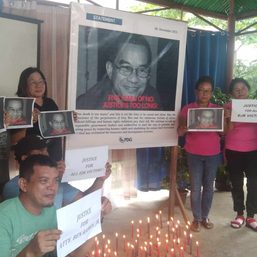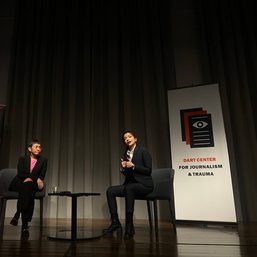SUMMARY
This is AI generated summarization, which may have errors. For context, always refer to the full article.
![[OPINION] Let 2021 be a year of reckoning](https://www.rappler.com/tachyon/2020/12/2021-year-of-reckon-december-23-2020.jpg)
The end of the year is shaping differently for Christmas-obsessed Filipinos, and this is not simply due to the absence of carolers on the streets and the dearth of the usually festive Christmas parties. During this turbulent year of pandemic and months-long lockdown, we marked the start of the Christmas week with a video of a gruesome murder.
On Monday, December 21, a video of a cop killing a mother and her son went viral. The police who took an oath to “serve and protect” shot the mother’s head first, point black. And then there was another shot in the son’s head. It all happened as his daughter watched, unflinching at the sight of blood.
It is said that the quarrel was triggered by a holiday noisemaker known as boga. Others claimed it’s been brewing for awhile over a right of way dispute.
Whatever it was, I think it’s wrong to say this is how this narrative truly started.
Of beginnings
It is true that the killing of the Gregorios is far from being an isolated case.
While the incident surfaced the online call to #EndPoliceBrutality, the issue stems from a larger, more deep-seated problem. And it falls under the bigger campaign banner of #StopTheKillingsPH.
Over the past few years, this narrative intensified in the slow and consistent moments where violence has been normalized and even translated to policy – from the Chief Executive’s license-to-kill pronouncements to the rising number of extrajudicial killings that go unpunished, many of which are unfortunately not documented in videos.
We saw the early signs of this story when dead bodies started turning up in dark streets and alleyways in 2016. We also saw it when the killings targeted minors like 17-year-old Kian delos Santos, 5-year-old Danica Garcia, 19-year-old Carl Arnaiz, and many more.
As lawyer John Molo said in his Thought Leaders piece, those in the legal profession felt this in the “loss of 55 (and counting) colleagues.” Activists felt this when Zara Alvarez and Randy Echanis were killed a few days apart.
This year, we also saw how this story persisted in the killing of Winston Ragos, a retired soldier who was killed by cops in a scuffle as they enforced quarantine rules in early April.
At this point, the President’s effort to distance himself from abusive cops and these senseless killings is futile. Especially after how this narrative of impunity and violence finds its roots in Duterte himself, when he ordered police and soldiers to “shoot” residents causing “trouble,” in complete disregard of the people’s rights to due process. Or when he promoted quarantine violator and rights abuser Debold Sinas as the next Philippine National Police chief.
This story further took shape in the direct and veiled threats made against dissenters, journalists, activists, students, and even celebrities who are carelessly tagged by government entities and officials as “communists” or “terrorists”.
2020 as tipping point?
Perhaps as a silver lining, these injustices, lack of accountability, and bad governance did not pass by without pushback.
In fact, I can describe 2020 as a tipping point for activism in the Philippines. Crushed by one crisis after another, Filipinos mobilized and channeled their anger to various ways and activities that we haven’t witnessed in recent years.
Filipinos braved the streets despite the strict physical distancing measures imposed by the police during the lockdown. Online, Filipinos who did not know each other worked efficiently to support health workers in the frontlines.
Celebrities and online influencers left their comfort zones and spoke up to criticize the government’s pandemic response, the ABS-CBN shutdown, and red-tagging. Fandoms fiercely fended off trolls and banded together to fill in the gaps in the government’s disaster response. Students – from Luzon to Mindanao – coalesced to call for a nationwide academic break.
When the video of the murder of the Gregorios went viral, our newsfeeds exploded with rage and calls for justice. The hashtags #StopTheKillingsPH even went viral in Dubai and Singapore.
Prior to this, many Filipinos would shy away from phrases such as “extrajudicial killings,” “defend press freedom,” “no to red-tagging” – these words popular only among activist circles.
But thanks partly to the efforts of human rights activists and advocates who exerted various efforts to mainstream these issues, these fighting words have now shaped public conversations, with celebrities, mothers, and students talking about these topics. Who could forget, for example, that it was this year when Aling Marie, a store owner, rose to popularity because she called out the President’s diehard supporters in an online video?
Thus while the pandemic indeed exposed the gaps in our systems, it also connected the abstract issues of governance and justice to how food reaches – or not – our tables.
So, yes, we can count a few small victories this year and it is but right to acknowledge how far we’ve come.
How this will end
However, if the viral video of the killing of Sonny and Frank Gregorio is any proof, we should be reminded that this story is far from over.
It does not simply end with our rage, for 2020 is not quite becoming the year of reckoning that this nation needs. Not yet, anyway.
I consider the video as a mocking reminder to us that there is no room for celebration – or even just a pretense of it – unless the arc of history finally bends back toward democracy and justice.
It will take a lot of dirty work, organizing, and education for this to happen.
In a few days, 2020 will pass. Our collective rage now may be eclipsed by the next tsismis or another national distraction.
But we should keep in mind how this year and this narrative of impunity started. We need to ask ourselves how we want this story of violence and senseless killings to end.
I hope for us that 2021 becomes a year of reckoning, a year of action. – Rappler.com
Add a comment
How does this make you feel?
![[EDITORIAL] Sorry Arnie Teves, walang golf sa kulungan](https://www.rappler.com/tachyon/2024/03/animated-arnie-teves-arrest-carousel.jpg?resize=257%2C257&crop=310px%2C0px%2C720px%2C720px)




There are no comments yet. Add your comment to start the conversation.